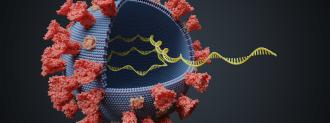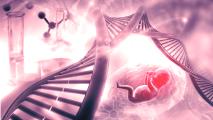One of the stranger things about the novel coronavirus is how it affects people so differently, killing some and not even causing symptoms in others.
We already know that people’s varying coronavirus symptoms are at least partially due to certain factors. People over the age of 60 and those with underlying medical conditions, for example, are more likely to experience severe symptoms than young, relatively healthy people.
But why do some young, healthy people still die from COVID-19?
Some researchers suspect the answer to the varying coronavirus symptoms experienced by COVID-19 patients might lie in their genomes — and they’re starting to find evidence to support that hunch.
Explaining Varying Coronavirus Symptoms
One group, from Oregon Health & Science University and the Portland VA Research Foundation, recently published a study in the Journal of Virology exploring how variations in human leukocyte antigen (HLA) genes might affect a person’s susceptibility to the coronavirus.
Why do some young, healthy people still die from COVID-19?
Those genes help the immune system respond to pathogens, and based on the researchers’ computer simulations, certain combinations of HLAs appear better equipped to help our bodies fight off a coronavirus infection than others.
That could potentially explain varying coronavirus symptoms amongst people from similar populations. But before anything can be done with the team’s research, it’ll need to be confirmed using actual COVID-19 patients.
HLA typing is a relatively cheap and quick genetic test, though, so that might not be an insurmountable hurdle.
If the findings do hold up, the information could be useful for identifying people who might be at a higher risk of a severe coronavirus response. Those individuals could then be prioritized for inoculation if/when a COVID-19 vaccine is ready, the authors wrote in their study.
The COVID-19 Host Genetics Initiative
Other researchers are skipping simulations and going straight to the source — COVID-19 patients’ DNA — to look for genetic factors that might explain varying coronavirus symptoms.
In March, a team from the University of Helsinki’s Institute for Molecular Medicine Finland (FIMM) launched the COVID-19 Host Genetics Initiative.
The project’s goal is to bring together the world’s human genetics community, giving researchers a way to share data and resources related to the hunt for any genetic factors that might play a role in a person’s reaction to COVID-19.
“We hope that by finding genetic mutations associated with susceptibility and severity for COVID-19 we can help to identify key genes,” FIMM geneticist Andrea Ganna said in a news release.
“This will facilitate drug repurposing, for example by prioritizing drugs that already target those genes,” he continued. “Moreover, human genetic findings can help in prioritizing the development of new drugs.”
A Coalition of Coronavirus Fighters
Scientists behind 150 coronavirus studies from across the globe have joined the initiative so far, and they’ve already collected samples from COVID-19 patients in Europe and the United States for analysis.
Hopefully, it won’t be long before this massive collaboration yields new insights into the role genetics might play in varying coronavirus symptoms.
“It’s been astonishing to see our front-line health care colleagues step up in such selfless and, frankly, dangerous ways to do their best to see us through this pandemic,” Nancy Cox, director of the Vanderbilt Genetics Institute, one of the initiative’s participants, said in a news release. “I think we scientists can do no less.”






